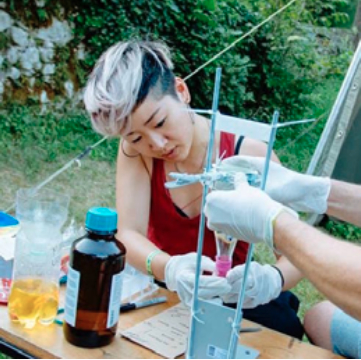Digital Habits Workshop and MAGGIC: Difference between pages
No edit summary |
No edit summary |
||
| Line 1: | Line 1: | ||
Mary Maggic is an artist and nomadic biohacker working at the intersection of biotechnology, cultural discourse, and civil disobedience. Her most recent project Open Source Estrogen seeks to emancipate the estrogen molecule, demonstrating its biopolitical ubiquity and ability to problematize sex and gender constructs. Her project, the Molecular Queering Agency, is here to guide you through the process of queering. Thanks to petrochemical, agricultural, and pharmaceutical forces, we live in a toxic landscape that is colonized by hormones. These endocrine disrupting molecules are able to transfect change at the morphological level, queering our bodies and bodies of non-human species. There is nothing that illustrates Haraway's concept of making kin like our collective queering in becoming, problematizing the heteronormative constructs of sex and gender. Can we embrace the molecular glitch to our bodies, and create a discourse that liberates us from the glorification of "natural?" The Molecular Queering Agency invites participants to be colonized by various samples of hormones extracted from biological and ecological sources. | |||
[[File:magicc_portrait.jpg]] | |||
==Activities== | |||
{{Special:WhatLinksHere/MAGGIC}} | |||
[[ | [[Category: Collaborators]] | ||
Revision as of 16:41, 9 January 2020
Mary Maggic is an artist and nomadic biohacker working at the intersection of biotechnology, cultural discourse, and civil disobedience. Her most recent project Open Source Estrogen seeks to emancipate the estrogen molecule, demonstrating its biopolitical ubiquity and ability to problematize sex and gender constructs. Her project, the Molecular Queering Agency, is here to guide you through the process of queering. Thanks to petrochemical, agricultural, and pharmaceutical forces, we live in a toxic landscape that is colonized by hormones. These endocrine disrupting molecules are able to transfect change at the morphological level, queering our bodies and bodies of non-human species. There is nothing that illustrates Haraway's concept of making kin like our collective queering in becoming, problematizing the heteronormative constructs of sex and gender. Can we embrace the molecular glitch to our bodies, and create a discourse that liberates us from the glorification of "natural?" The Molecular Queering Agency invites participants to be colonized by various samples of hormones extracted from biological and ecological sources.
